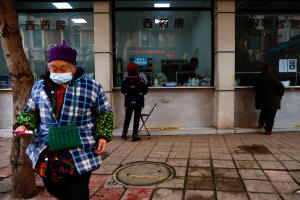Rural residents worry for elderly as COVID rips across China
 Send a link to a friend
Send a link to a friend
 [December 30, 2022]
By Martin Quin Pollard, Xiaoyu Yin and Tingshu Wang [December 30, 2022]
By Martin Quin Pollard, Xiaoyu Yin and Tingshu Wang
LEZHI (Reuters) - In a busy village clinic in Lezhi county in southwest
China's Sichuan province on Thursday, 59-year-old Yang waited anxiously
as her husband received an intravenous drip in the adjacent room.
For more than a week he has had a fever, chills, a cough, and other
COVID-like symptoms, she said, like millions of other Chinese caught in
a coronavirus wave after authorities dismantled zero-COVID policies this
month.
Experts say the elderly in rural areas may be particularly vulnerable
because of their vaccine hesitancy and inadequate medical resources.
Next month's Lunar New Year festival, when hundreds of millions will
travel to their hometowns, will add to the risk.
"I'm worried, I'm scared," an emotional Yang said between frequent
glances at her husband, a construction worker surnamed Xiong. "This
isn't just a light illness like they are saying online."
Xiong, who has received three shots of China's domestically produced
vaccine, was confident he would feel better soon. But he was concerned
about reinfection and says things were better before opening up.
"Practically everyone at my construction site has been infected," he
said. "Since the opening up, the virus has spread everywhere."

Yang and Xiong, like several others interviewed for this article,
declined to give their full name, a common practice in China for people
who agree to speak to reporters.
Next to Xiong in the small office-sized treatment room in the Kongque
village clinic four other patients, all but one elderly and all on IV
drips, lay coughing intermittently.
"It's a bit worse than the original cold," said Tang Shunping, 80. "I
was taking cold and flu supplements and I was fine, but now they don't
work anymore."
On the other side of the room, Chen Lifen, 86, who suffers from other
conditions including heart disease and high blood pressure, was
accompanied by her daughter and full-time caregiver, Liao Xiaofeng.
Chen has not been vaccinated. The family had concerns after hearing
stories online of possible side effects, Liao said.
Several locals in the area, around 90 minutes east of Sichuan province's
capital, Chengdu, said that although the virus was everywhere, it is "as
the state says, just like a cold," reflecting the recent about-face in
messaging from Chinese authorities.
PATIENT NUMBERS
Chen Changying, a doctor in Yongquan, a small town near Lezhi county,
said that since China ended nearly three years of COVID curbs this
month, patient numbers have more than doubled to around 100 a day.
[to top of second column]
|

Elderly people pick up medicine at a
pharmacy near a hospital after strict measures to curb the
coronavirus disease (COVID-19) were removed nationwide, in Yongquan
town of Jianyang, Sichuan province, China December 29, 2022.
REUTERS/Tingshu Wang
 Most patients have the same symptoms
suggesting a COVID infection, and most are elderly, she said.
"I'm definitely worried," the doctor said. "Many elderly people have
underlying diseases such as chronic bronchitis and this virus can
easily lead to a lung infection."
Amid a nationwide wave of infections, which experts say could have
reached hundreds of millions, China is scrambling to reinforce
overwhelmed hospitals and restock pharmacies.
Paxlovid, the Pfizer-made COVID medicine, is in particularly high
demand, with many Chinese attempting to get the drug abroad and have
it shipped to China.
China's top health body this week instructed local authorities
"promote" and organise traditional Chinese medicine to treat COVID,
state media reported on Thursday.
PHARMACIES SHORT OF DRUGS
57-year-old Wang, who has run a Chinese and Western medicine
pharmacy in Yongquan with her husband for decades, said that the
weeks since reopening have been the busiest they've ever known, and
that drugs are in short supply.
Many people have stockpiled medicines because of the sudden wave of
infections, she said.
In Lezhi county, Liao, a farmer with two children whose husband is
working in a faraway province, bought an oxygen concentrator online
to help with her mother's breathing.
Liao does not plan to take her mother to the county hospital or a
facility in a bigger city because she worries it will be costly and
difficult to see a doctor.
She and others in Lezhi said things were better when COVID curbs
were in place.

"It used to be good when the virus was well controlled," Liao said.
"When it was controlled, there was no such phenomenon. Now they
don't manage it anymore, so now all the young and old are getting
infected."
(Reporting by Martin Quin Pollard, Xiaoyu Yin and Tingshu Wang;
Writing by Martin Quin Pollard; Editing by Sumeet Chatterjee and
Gerry Doyle)
[© 2022 Thomson Reuters. All rights
reserved.] This material may not be published,
broadcast, rewritten or redistributed.
Thompson Reuters is solely responsible for this content. |